Algunas marcas de latas de atún en conserva participan en la sobrepesca y esquilman los océanos. Quermos un atún sostenible
Greenpeace’s second canned tuna ranking reveals that there has been positive change in the Canadian market since last year. Half of the 14 brands surveyed are heading in the right direction, removing Redlisted tuna from sale and committing to switch to sourcing from fisheries that use more sustainable fishing methods. But most companies are not acting fast enough.
Overfishing and wasteful fishing practices threaten our global tuna stocks and other marine species like sharks, turtles and seabirds. Click on a brand to see who is working to change that.
Click on a brand to see how they rate.
Ask Clover Leaf to switch to ocean-friendly tuna
Clover Leaf must act now to guarantee responsibly sourced tuna for its customers and stop canning tuna from fisheries that waste other marine life.
Take action! Call the company to ask why they refuse to join other leading brands in their commitment to make their tuna greener. Don’t our oceans and Clover Leaf customers deserve better?
Call Ron Schindler, Executive Vice President and Managing Director and ask him to urge the CEO, Chris Lischewski, to act now.
Call Ron at 1 905-474-0608 extension 7094
-
• If you cannot get through, press 1 or 2 for customer service or call the toll-free number at 1 877-893-9880.
Clover Leaf must act now to:
-
• stop sourcing Redlisted yellowfin tuna
-
• switch to more sustainable fishing methods to catch their skipjack, like FAD-free purse seining and pole and line
-
• transition away from harmful longlines to cleaner fishing methods for albacore tuna
-
• ensure fair and equitable tuna
-
• support ocean protection by committing to not source from proposed marine reserves like the high seas area in the Western and Central Pacific Ocean known as the Pacific Commons
1. Raincoast Trading - 92%
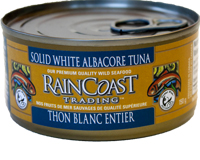
Raincoast works hard to deliver on its promise of being an eco-brand of canned tuna. A close relationship with its supply chain, all the way back to the water, combined with rigorous sourcing criteria, demonstrates Raincoast’s eagerness to be a responsible company. Setting the company’s commitments in stone in 2011 caused this B.C. company to rise to the top of this year’s ranking.
- In 2011, Raincoast formalized its commitments to sustainable tuna through the adoption of a written procurement policy, which detail strong sourcing criteria.
- Raincoast does not source tuna from longlines, nets, or illegal fisheries.
- Raincoast Trading can trace its tuna from ship to can and uses the information obtained to provide detailed product labels, including how and where the tuna was caught, in addition to an Ocean Wise stamp of approval.
- Raincoast supports local fisheries but could be more explicit on the creation of marine reserves.
Download full profile
2. Wild Planet - 82%

Wild Planet’s commitment to sustainable tuna goes beyond its products. The company’s drive to ensure healthier tuna stocks and ocean ecosystems is evident through its engagement, not only with suppliers, but with tuna management organizations. Wild Planet’s clearly defined procurement practices and policies have set a high bar for the Canadian market, and its rank and score reflects that.
- Wild Planet revised and strengthened its sustainable sourcing policy in 2011.
- Wild Planet does not source from destructive fishing methods such as longlining or purse seiners using FADs. Wild Planet skipjack tuna is caught by pole and line and its albacore by trolling.
- Wild Planet has made a commitment not to source from proposed marine reserves like the Pacific Commons of the Western and Central Pacific Ocean.
- Wild Planet has a comprehensive labeling scheme for its products, which allows its customers to know more about the tuna they buy.
- Wild Planet supports equitable fishing but should reconsider getting its product canned offshore.
Download full profile
3. Canfisco - 56%
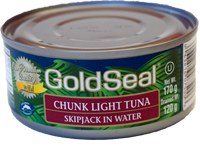
Canadian Fishing Company (Canfisco) has climbed the ranks in the past year and has made some commendable changes to its tuna sourcing policies and practices. As a major national brand in Canada, this company will help green supermarket shelves across the country with its aspirations for greener Gold Seal tuna. Canfisco must take strong action to ensure its suppliers make a quick switch to less destructive fishing methods.
- Canfisco committed not to source its skipjack from purse seiners using Fish Aggregating Devices (FADs) by 2015, and currently sources FAD-free when possible and traceable.
- Redlisted yellowfin tuna has been discontinued from Gold Seal products.
- Canfisco supports the creation of marine reserves in the high seas of the Western and Central Pacific Ocean and committed not to source tuna from these regions by 2015.
- Canfisco has not made a firm commitment to address the negative impacts that its longline-caught albacore has on other marine life.
- Canfisco labels lack information on catch method.
Download full profile
4. Ocean Brands - 55%
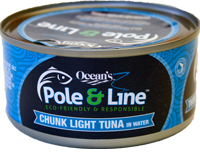
Ocean Brands has begun to rid its products of harmfully fished tuna and has introduced a more sustainable product line. A firm commitment and timeline for a 100 per cent switch to more sustainable and equitable tuna will keep this company high up the stack.
- Ocean Brands has discontinued Redlisted yellowfin tuna.
- Ocean’s is the first Canadian national brand to sell pole and line skipjack tuna harvested by fishermen from the Maldives.
- Ocean Brands has a sustainability policy that helps guide the company’s tuna soucing.
- When possible Ocean Brands sources the remainder of its skipjack from Fish Aggregating Device (FAD) free purse seiners, but most is still coming from fisheries using FADs without the ability to ensure FAD-free.
- With the exception of the pole and line skipjack product line, Ocean’s product labels do not include how and where the tuna was caught.
Download full profile
6. Sobeys - 53%
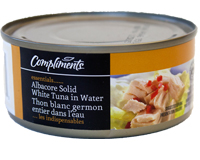
This could be a year of positive change in Sobeys’ canned seafood aisle if the company stays true to its vow to tighten up its sourcing criteria and seek more sustainable tuna supplies. Sobeys has prioritized consumer education on various products, but needs to include its private label canned tuna in this initiative. Promises caused this company to move up the rankings this year, but only action will keep them there.
- Sobeys has a sustainable seafood policy that includes its canned seafood.
- Sobeys is revamping its canned tuna sourcing strategy to focus more on sustainability and equitability criteria.
- Sobeys still sources its tuna from purse seiners using FADs and longlines.
- Sobeys’ private label products do not tell the customers where and how the tuna was caught.
- Sobeys has not made a firm commitment to avoid tuna fished in proposed marine reserves.
Download full profile
5. Safeway - 54%
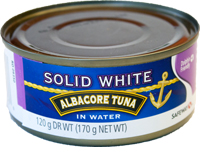
Safeway has shot up in the ranks this year, reflecting the strong steps taken by the company to ensure more sustainable and equitable canned skipjack tuna for its customers. If Safeway builds on this momentum and develops a plan for its full private label tuna offerings, this company can secure its position as a market leader in ocean-friendly tuna.
- Safeway has a sustainable seafood policy that covers its private label canned tuna.
- Safeway was the first major retailer to commit to switch 100 per cent of its skipjack tuna to Fish Aggregating Device(FAD)-free purse seine or pole and line tuna by the end of 2012.
- Safeway removed yellowfin tuna from sale in 2011 due to stock health concerns.
- Safeway committed not to source its responsibly-sourced skipjack tuna from the proposed marine reserves of the Western and Central Pacific ocean.
- Safeway brand product labels currently donot state how and where the tuna is caught.
- Safeway brand albacore comes from destructive longline fisheries and the company has not yet developed a plan to change that.
Download full profile
7. Loblaw - 49%
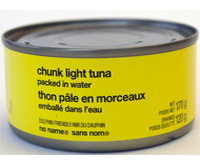
Loblaw is sitting right below the passing mark this year, with some steps in the right direction and yet much to achieve. As the company removes private label brands that are not measuring up, and introduces a new greener line of albacore to its shelves, Loblaw’s next step should be to commit to switch its skipjack to 100 per cent Fish Aggregating Device (FAD)-free purse seine or pole and line sources by 2013.
- Loblaw’s sustainable seafood policy applies to its private label canned tuna and contains various strong sourcing criteria.
- Loblaw introduced a more sustainable troll-caught albacore line early in 2012 under its President’s Choice brand.
- Loblaw's skipjack tuna comes from harmful FAD fisheries.
- With the exception of President’s Choice Marine Stewardship Council (MSC) albacore, Loblaw’s tuna comes from harmful longlines and purse seiners using Fish Aggregating Devices (FADs).
- Loblaw currently has no commitment to ensure its tuna comes from equitable fisheries.
Download full profile
8. Bolton - 49%

Bolton may have gone up in the ranking this year but its credibility has gone down since the company teased its customers with promises of a 100 per cent switch to sustainable tuna, which it later watered-down. Bolton has made some commendable commitments through the adoption of its sustainable procurement policy, but many are Eurocentric, leaving Canadian customers with little hope for greener options.
- Bolton has committed to switch 45 per cent of its skipjack to Fish Aggregating Device (FAD) free purse seining or pole and line by 2013.
- Bolton has committed to not source tuna from the proposed marine reserves of the Western and Central Pacific Ocean..
- Rio Mare brand tuna is not caught with longlines or drifnets.
- Rio Mare skipjack tuna still comes from fisheries employing destructive practices.
- Bolton sells Redlisted yellowfin tuna in its Rio Mare brand and has no timeline to discontinue it in the Canadian market.
- Rio Mare brand product labels do not provide information about how and where the tuna was caught.
Download full profile
9. Clover Leaf - 48%
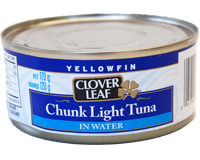
As Clover Leaf works hard to project a green public image, its cans still contain Redlisted tuna. Canada’s largest canned tuna brand focuses on its International Seafood Sustainability Foundation (ISSF) membership, with less time allocated to setting clear plans or timelines to change the content of its cans. Will Clover Leaf can the green talk and focus on green action in 2012? Or will this major market player sink to the bottom of the ranking as its competitors make all the moves for healthier oceans?
- Clover Leaf 's sustainable sourcing policy has a strong focus on improving the traceability of its products. The policy and the company’s initiatives are outlined on its website for its customers.
- Clover Leaf sells Redlisted yellowfin tuna and has no plans to discontinue it.
- Clover Leaf sources from purse seine fisheries using Fish Aggregating Devices (FADs) and longlines that take a toll on other marine species and vulnerable tuna stocks.
- Clover Leaf canned tuna product labels do not indicate the fishing method or area of catch for the species.
- Clover Leaf has not made a commitment to ensure its tuna is equitable.
Download full profile
10. Overwaitea Food Group- 46%

Overwaitea Food Group (OFG) has shown some interest in greening its Western Family line of tuna with the introduction of a more sustainable line and the removal of tuna from unhealthy stocks. OFG needs to specify its tuna sustainability goals and ensure the rest of its product line does not come from wasteful fisheries. A strong commitment in 2012 could help OFG join the ranking's leaders.
- OFG discontinued yellowfin tuna from its Western Family brand.
- OFG sells a line of more sustainable troll-caught albacore tuna.
-
- The rest of OFG’s albacore comes from longlines that incidentally catch other marine life.
- Western Family skipjack tuna is sourced from purse seine fisheries that use Fish Aggregating Devices (FADs) and OFG has not made a commitment to change that.
- Western Family product labels lack information about how and where the tuna was caught.
- Western Family has not made a public commitment to support the creation of marine reserves to help safeguard tuna for future generations.
Download full profile
11. Metro - 45%

In the past year Metro has worked to better understand where and how its tuna is caught, but it remains unclear what exactly the company plans to do with this information. Metro’s refusal to take a strong and precautionary stance in favour of ensuring healthy tuna stocks and more sustainable fishing methods are sourced to fill its private label brand has caused this major retailer to drop in the rankings this year.
- Metro’s sustainable seafood policy covers its private label canned tuna
- Metro still sells Redlisted yellowfin tuna.
- Metro sources from destructive longlines and purse seiners that employ Fish Aggregating Devices (FADs).
- Metro has made no commitment to avoid tuna coming from proposed marine reserves.
- Metro does not provide the area of catch or fishing method on its Selection brand labels.
Download full profile
12. Walmart - 42%
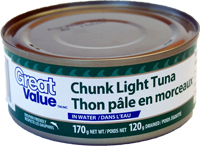
Walmart’s International Seafood Sustainability Foundation (ISSF) commitment and improvements in traceability in 2011 were not enough to keep this retail giant from dropping in the ranks. Walmart must take its sustainable seafood commitment even further and commit to switching to 100 per cent Fish Aggregating Device (FAD)-free or pole and line skipjack by 2013.
- Walmart’s sustainability policy emphasizes the need for strong traceability to weed out illegally sourced tuna.
- Great Value tuna comes from purse seine fisheries employing FADs and harmful longlines.
- Walmart has not committed to support ocean protection through putting aside significant areas of the oceans in marine reserves.
- Walmart’s sustainable seafood policy’s sourcing criteria do not ensure equitable products for its Great Value customers.
- Great Value tuna product labels contain a dolphin-friendly logo, species common name and country of processing but do not include the fishing method or area of catch.
Download full profile
13. Unico - 21%
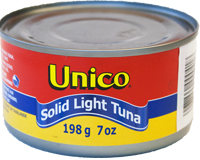
Unico decided to respond to Greenpeace’s tuna survey this year. As a result, the company has increased the transparency of its tuna sourcing. But the company’s practices still take a huge toll on our oceans, and there is no indication that the company has any plans to change that. Unico jumped up one spot in the ranking, but is still failing our oceans.
- Unico still does not have a sustainable seafood policy.
- Unico sources tuna from destructive skipjack purse seine fisheries using Fish Aggregating Devices (FADs) and has no commitment to transition to more sustainable tuna.
- Unico does not publicly support equitable fishing, or the creation of marine reserves to help protect the future of the tuna it sources.
- Unico labels lack information about where and how the tuna was caught.
Download full profile
14. Pastene - 4%
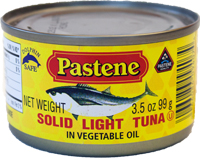
Pastene did not respond to Greenpeace's survey this year and continues to skirt any discussion on the sustainability of its tuna. The company’s lack of transparency should raise a red flag for its customers, who have no way of knowing what is really in Pastene's cans. Pastene finds itself at the bottom of this year’s ranking - not even on the sustainability radar.
- Pastene still lacks a sustainable seafood procurement policy and has no commitment to ensure more sustainable and equitable tuna.
- Pastene sells unsustainable tuna, including Redlisted yellowfin tuna.
- Little is known about the origin of Pastene’s tuna products.
- Pastene brand labels include nothing more than the country of processing and a dolphin-safe logo.
- Pastene refuses to engage in a discussion about its tuna procurement.
Download full profile